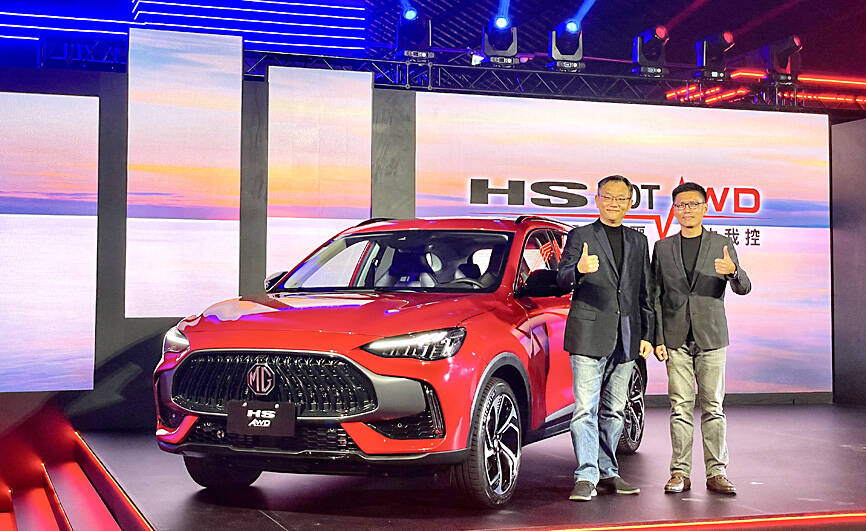China Motor Corp (中華汽車) yesterday said it has boosted the local content ratio to the required 20 percent for MG electric vehicles (EVs) developed by China’s MG Motor Co, paving the way for the popular EVs to return to the local market in the near future.
China Motor helps assemble MG EVs in Taiwan with a majority of key parts from China to save on costs, but it was forced to suspend sales of the vehicles in August after new local content regulations took effect. The firm also only accepted limited new orders for MG’s HS sport utility vehicles and ZH compact cars, citing an insufficient inventory of components.
The Ministry of Economic Affairs tightened local content regulations in August amid fear that low-cost Chinese cars would undermine the domestic auto industry. Under the new rules, automakers must have 20 percent of the components in their vehicles locally made during the first-year of sale, and see the rate increase to 30 percent in the second year and 35 percent in the third year.

Photo: Amy Yang, Taipei Times
“We are quickening our pace in boosting the local content ratio to meet the mandatory requirement in collaboration with our suppliers,” China Motor vice president Chien Ching-wu (錢經武) told investors during an online conference yesterday.
The company yesterday reported revenue expanded 16.52 percent annually to NT$32.22 billion (US$990 million) in the first nine months of the year, from NT$27.65 billion, aided by the sales of new MG cars.
Net profit plummeted 25.24 percent to NT$3.27 billion from NT$4.37 billion a year earlier, attributable to lower gains from its Chinese car business amid stiff competition and a higher comparison base last year associated with its insurance arm, Tokio Marine Newa Insurance Corp (新安東京海上產險), the firm said.
Earnings per share sank to NT$5.99 during the first nine months, from NT$8.01 in the same period last year.
The company did not offer its business outlook for next year, but said it is developing a new electric commercial car likely to be launched next year.
“The MG HS 1.5T model is the most important model among all of the MG series in the pipeline, so we will prioritize this model when applying for a local content certification. HS now contains more than 20 percent locally made parts,” Chien said.
Chien declined to confirm if the HS model is to return to the market by the end of this year, since the regulatory hurdles are almost cleared.
The company plans to raise prices for the MG cars containing more locally-made parts because of higher costs, he said.

SETBACK: Apple’s India iPhone push has been disrupted after Foxconn recalled hundreds of Chinese engineers, amid Beijing’s attempts to curb tech transfers Apple Inc assembly partner Hon Hai Precision Industry Co (鴻海精密), also known internationally as Foxconn Technology Group (富士康科技集團), has recalled about 300 Chinese engineers from a factory in India, the latest setback for the iPhone maker’s push to rapidly expand in the country. The extraction of Chinese workers from the factory of Yuzhan Technology (India) Private Ltd, a Hon Hai component unit, in southern Tamil Nadu state, is the second such move in a few months. The company has started flying in Taiwanese engineers to replace staff leaving, people familiar with the matter said, asking not to be named, as the

The prices of gasoline and diesel at domestic fuel stations are to rise NT$0.1 and NT$0.4 per liter this week respectively, after international crude oil prices rose last week, CPC Corp, Taiwan (台灣中油) and Formosa Petrochemical Corp (台塑石化) announced yesterday. Effective today, gasoline prices at CPC and Formosa stations are to rise to NT$27.3, NT$28.8 and NT$30.8 per liter for 92, 95 and 98-octane unleaded gasoline respectively, the companies said in separate statements. The price of premium diesel is to rise to NT$26.2 per liter at CPC stations and NT$26 at Formosa pumps, they said. The announcements came after international crude oil prices

SinoPac Financial Holdings Co (永豐金控) is weighing whether to add a life insurance business to its portfolio, but would tread cautiously after completing three acquisitions in quick succession, president Stanley Chu (朱士廷) said yesterday. “We are carefully considering whether life insurance should play a role in SinoPac’s business map,” Chu told reporters ahead of an earnings conference. “Our priority is to ensure the success of the deals we have already made, even though we are tracking some possible targets.” Local media have reported that Mercuries Life Insurance Co (三商美邦人壽), which is seeking buyers amid financial strains, has invited three financial

CAUTION: Right now, artificial intelligence runs on faith, not productivity and eventually, the risk of a bubble will emerge,’ TIER economist Gordon Sun said Taiwanese manufacturers turned more optimistic last month, ending a five-month streak of declining sentiment as concerns over US tariffs, currency volatility and China’s overcapacity began to ease, the Taiwan Institute of Economic Research (TIER) said yesterday. The manufacturing business confidence index rose 1.17 points from June to 86.8, its first rebound since February. TIER economist Gordon Sun (孫明德) attributed the uptick to fading trade uncertainties, a steadier New Taiwan dollar and reduced competitive pressure from Chinese producers. Taiwan’s semiconductor industry is unlikely to face significant damage from Washington’s ongoing probe into semiconductors, given the US’ reliance on Taiwanese chips to power artificial